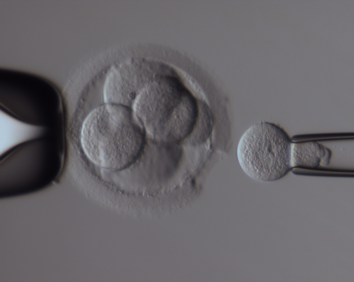The Center for Reproductive Medicine at UMC Utrecht is a nationally and internationally respected expert center and key player in clinical and translational scientific research. Both care and research is aimed at optimizing the chance of a healthy conception and thereby the chance of a healthy child. Research focusses on predicting and maximizing reproductive potential.
Research focusses on increasing the chance of successful implantation (clinical research into fertility interventions), basic and translational endometrium research, basic research into intrauterine growth restriction and prevention of transmission of known genetic traits to the future child (preimplantation genetic testing (PGT).
The lifecycle perspective of the Reproductive Medicine work fits perfectly within the Child Health strategic theme, as many formerly lethal childhood diseases are now considered chronic diseases. When these children reach adulthood, they may be confronted with reduced fertility for which fertility counselling and preservation treatments can be offered. Many will also have questions on whether their disease may be passed on to their future offspring. For these individuals PGD can be offered to prevent transmission of their genetic trait to the next generation.
Both Reproductive Medicine research and care have a unique lifecycle perspective starting preconceptionally with research into genetic causes of infertility in the chromosomal, monogenic and polygenic space as well as research into the etiology of aneuploidy in collaboration with the Department of Clinical Science at the Faculty of Veterinary Medicine at Utrecht University. Furthermore the UMC Utrecht is the principal provider of PGT in The Netherlands (www.pgtnederland.be) and a key player in research into successful implantation and the birth of a healthy child.
Furthermore, for the long-term effect of childhood disease on later fertility, our department provides both care and research, aimed at fertility counselling and fertility preservation. This is operational in the LATER poli in the Prinses Maxima Center/UMC Utrecht (Paediatric Oncologists prof. dr. M.M. van den Heuvel-Eibrink, dr. Marianne van de Wetering, dr. Margreet Veening, prof. dr. Leendert Looijenga and others) and a close collaboration for clinical fertility preservation care and clinical research with the Department of Reproductive Medicine (prof. dr. Willem Verpoest, dr. Simone Broer). These teams will share a long-term follow-up database in which early determinants can be connected to late fertility outcome. The team is currently in the process of extending this concept to several other childhood diseases.
The Reproductive Medicine research team collaborates with UMCU researchers from the fields of Obstetrics (dr. T. Lely, prof. dr. Bloemenkamp), Benign Hematological Disorders (dr. M. Bartels), Childhood Oncology (prof. dr. M.M van den Heuvel-Eibrink) and Clinical Genetics (dr. M. Ausems, dr. K. Lichtenbelt). For early determinants of late fertility outcomes in several other childhood diseases, collaboration is being sought with dr. H. van Santen (Endocrinology) and prof. dr. K. van der Ent (Cystic Fibrosis).
Nationally, the team is one of the strongest partners in the NVOG consortium 2.0 (the research consortium of the Dutch Society for Obstetrics and Gynecology), ‘PGD Nederland’ (the Dutch consortium for PGD). The Reproductive Medicine part of the NVOG consortium 2.0 is a highly effective research network including all Dutch fertility clinics, making it very powerful to perform high quality, relevant studies within restricted time periods. In PGD Nederland the researchers perform long-term follow-up of children born after PGD. Research into potential long term health effects of IVF/ICSI on children, adolescents and young adults born conceived via these techniques is performed in the large OMEGA cohort.
The Department of Reproductive Medicine at UMC Utrecht has ongoing translational research in the field of implantation (principal investigator: Dr Gaby Steba, assistant professor) by studying endometrial and tubal organoid models, as well as clinical research into luteal phase support for optimization of implantation conditions (principal investigator: Dr Simone Broer).
The research team has regular consultations with Freya, the Dutch society for people facing infertility, which stimulates patient-oriented research and mutual relationships. Since 2017 we are part of COMMIT (a Cochrane initiative) which aims to develop a core outcome measure set for infertility research. In this process we closely collaborate with Freya and Fertility Europe, the European umbrella organization representing patient associations in the field of (in)fertility in more than 20 European countries. In 2018 the ‘Setting Future Priorities for Infertility Research’ was launched by the COMMIT group in which Freya, Fertility Europe and researchers from the UMC Utrecht are again partners. Patients are also actively involved in setting the national research agenda of the NVOG (site in Dutch) in conjunction with ZonMW. In the field of onco-fertility, patients are actively involved in research initiatives, locally in collaboration with the Fertility working group in the Prinses Maxima Center and nationally with the special interest group Fertility Preservation.
